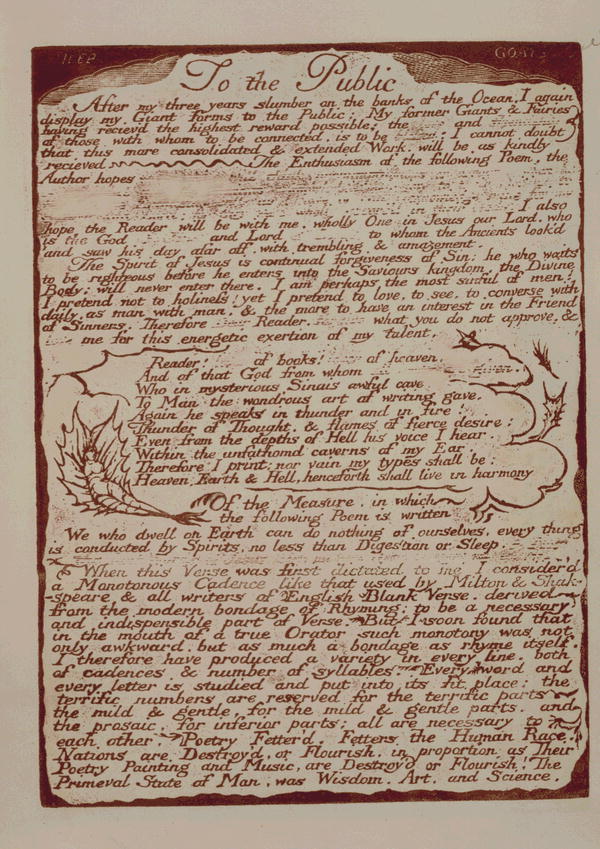(Erdman tells us that this plate may be thought of as single
pages. In his Illuminated Blake (page291) he describes the
swan with five fish, one near it and the others running down
the right margin. You may also see two open mouthed eels.
Erdman also describes here the lower picture of Plate 11.)
PLATE 12 text
Why wilt thou give to her a Body whose life is but a Shade?.
Her joy and love, a shade: a shade of sweet repose:
But animated and vegetated, she is a devouring worm:
What shall we do for thee O lovely mild Jerusalem?
And Los said. I behold the finger of God in terrors!
Albion is dead! his Emanation is divided from him!
But I am living! yet I feel my Emanation also dividing
Such thing was never known! O pity me, thou all-piteous-one!
What shall I do! or how exist, divided from Enitharmon?
Yet why despair! I saw the finger of God go forth
Upon my Furnaces, from within the Wheels of Albions Sons:
Fixing their Systems, permanent: by mathematic power
Giving a body to Falshood that it may be cast off for ever.
With Demonstrative Science piercing Apollyon with his own bow!
God is within, & without! he is even in the depths of Hell!
Such were the lamentations of the Labourers in the Furnaces!
And they appeard within & without incircling on both sides
The Starry Wheels of Albions Sons, with Spaces for Jerusalem:
And for Vala the shadow of Jerusalem: the ever mourning shade:
On both sides, within & without beaming gloriously!
Terrified at the sublime Wonder, Los stood before his Furnaces.
And they stood around, terrified with admiration at Erins Spaces
For the Spaces reachd from the starry heighth, to the starry
depth;
And they builded Golgonooza: terrible eternal labour!
Of soft Ethinthus? near Tyburns fatal Tree? is that
Mild Zions hills most ancient promontory; near mournful
Ever weeping Paddington? is that Calvary and Golgotha?
Becoming a building of pity and compassion? Lo!
The stones are pity, and the bricks, well wrought affections:
Enameld with love & kindness, & the tiles engraven gold
Labour of merciful hands: the beams & rafters are forgiveness:
The mortar & cement of the work, tears of honesty:
the nails,
And the screws & iron braces, are well wrought blandishments,
And well contrived words, firm fixing, never
forgotten,
Always comforting the remembrance: the floors,
humility,
The cielings, devotion: the hearths, thanksgiving:
Prepare the furniture O Lambeth in thy pitying looms!
The curtains, woven tears & sighs, wrought into lovely forms
For comfort. there the secret furniture of Jerusalems chamber
Is wrought: Lambeth! the Bride the Lambs Wife loveth thee:
Thou art one with her & knowest not of self in thy supreme joy.
- 155 -
Go on, builders in hope: tho Jerusalem wanders far away,
Without the gate of Los: among the dark Satanic wheels.
Fourfold the Sons of Los in their divisions: and fourfold,
The great City of Golgonooza: fourfold toward the north
And toward the south fourfold, & fourfold toward the east & west
Each within other toward the four points: that toward
Eden, and that toward the World of Generation,
And that toward Beulah, and that toward Ulro:
Ulro is the space of the terrible starry wheels of Albions sons:
But that toward Eden is walled up, till time of renovation:
Yet it is perfect in its building, ornaments & perfection.
And the Four Points are thus beheld in Great Eternity
West, the Circumference: South, the Zenith: North,
The Nadir: East, the Center, unapproachable for ever.
These are the four Faces towards the Four Worlds of Humanity
In every Man. Ezekiel saw them by Chebars flood.
And the Eyes are the South, and the Nostrils are the East.
And the Tongue is the West, and the Ear is the North.
And the North Gate of Golgonooza toward Generation;
Has four sculpturd Bulls terrible before the Gate of iron.
And iron, the Bulls: and that which looks toward Ulro,
Clay bak'd & enamel'd, eternal glowing as four furnaces:
Turning upon the Wheels of Albions sons with enormous power.
And that toward Beulah four, gold, silver, brass, & iron:











